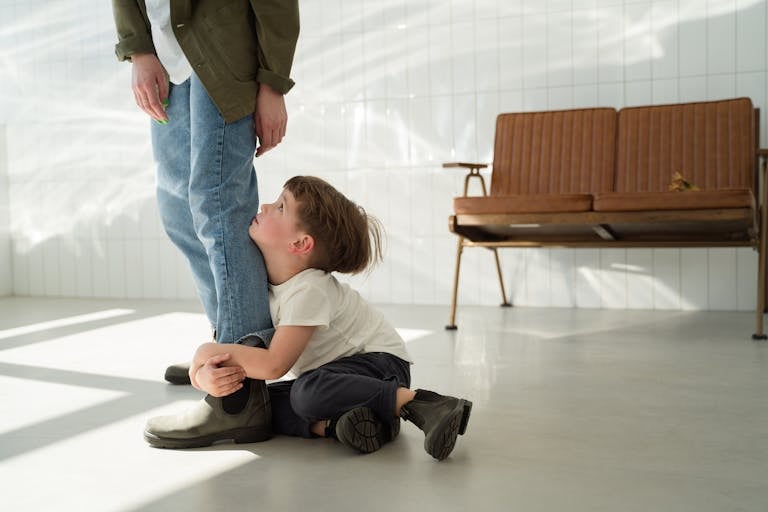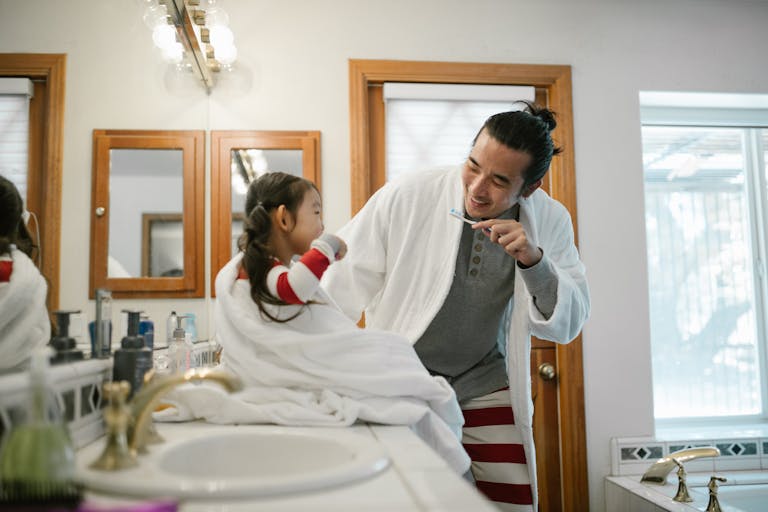From Chaos to Cooperation: Making Household Chores for Kids Work for Your Family
Getting kids involved in chores isn’t just about having extra hands to fold those mysteriously multiplying socks. Research shows that children who do chores develop stronger work ethics, better problem-solving skills, and higher self-esteem. They learn they’re capable contributors to the family team, not just adorable chaos creators (though they’re definitely that too).
Introducing children to chores is a great idea for building responsibility and life skills that will benefit them in the long run.
The truth is, building a system that actually works takes some trial and error, a healthy dose of patience, and maybe a few dance parties along the way. But when you find that sweet spot where your kids are genuinely excited to help? Parenting gold.
This post will walk you through age-appropriate chore ideas, how to make household tasks fun, and how to build lasting responsibility habits that stick—all without the daily drama.
Why Chores Matter More Than You Think
Let’s talk about the magic that happens when kids roll up their sleeves and get into household tasks. Beyond the obvious benefit of getting help with that never-ending to-do list, chores for kids are a foundation for life skills that extend far beyond a tidy home.
When children do age-appropriate tasks, they’re getting a crash course in real-world preparation. That four-year-old carefully sorting silverware isn’t just helping with dishes—they’re developing fine motor skills, learning categorization, and building the neural pathways that will serve them well when they’re tackling more complex organizational challenges later in life.
Chores contribute to the smooth running of the household and to the personal development of children, responsibility, teamwork, and growth.
Research from Harvard University followed children for decades and found that those who had chores starting at ages 3 and 4 were more likely to have successful careers, better relationships, and higher levels of life satisfaction as adults. The connection isn’t coincidental. When kids experience the satisfaction of completing a task and seeing the direct impact of their contribution, they develop what psychologists call “intrinsic motivation”—the internal drive to tackle challenges and see them through to the end.
The key insight here is that chores teach kids they’re capable of making a difference. In a world where children often feel powerless, household responsibilities give them a concrete way to see their positive impact on the family’s daily life.
Age-Appropriate Chores That Actually Work
Toddlers (Ages 2-4): The Tiny Helper Stage
At this stage, your little ones are basically tiny sponges that want to copy everything you do. The secret is to channel that natural curiosity into simple, manageable tasks that feel like play, not work. Remember, we’re building positive associations here, not training future housekeepers.
Simple tasks work beautifully: putting toys in designated bins, matching socks (even if the pairs are creatively interpreted), and helping feed pets under supervision. The magic word here is “helper”—toddlers love being your special assistant, not someone being asked to do work.
Make it feel like the adventure it actually is for them. Turn sock matching into a game of finding “sock friends” or let them be the “toy taxi driver” who gives toys rides back to their homes. The goal isn’t perfection—it’s participation and building those early positive connections by contributing to family life.
School Age (Ages 5-10): Building the Foundation
This is where things get really interesting. School-age kids have developed better motor skills and can handle more complex tasks, but they’re also starting to test boundaries and figure out their own preferences. For this age group, it’s important to assign chores that match their developmental stage and abilities, so tasks are both challenging and achievable. It’s the perfect time to expand responsibilities while keeping things manageable.
Think making beds (even if they look like abstract art at first), setting the table, basic meal prep like washing vegetables or making their own sandwiches, and taking care of their own belongings. This is also when you can introduce the concept of weekly responsibilities and simple scheduling.
Here’s where your sense of humor becomes your best parenting tool. When your eight-year-old says “I forgot” about their assigned task, try responding with understanding rather than frustration. “Happens to the best of us! Let’s figure out a system that helps you remember.” Maybe it’s a colorful chart, maybe it’s setting a phone timer, or maybe it’s pairing the chore with something they already do daily. The key is problem-solving together, not turning forgotten chores into power struggles.
Tweens & Teens (Ages 11+): Real Responsibility
Welcome to the eye-roll phase! But don’t let those dramatic sighs fool you—this is when your teenager can take on genuinely helpful tasks that prepare them for independent living. Teenagers are ready for more complex responsibilities such as laundry (including the mysterious art of not turning everything pink), meal planning and cooking, budget-friendly grocery shopping, and managing their own and shared spaces.
Chore assignments are especially important at this stage—get your teenager involved in choosing certain tasks which foster responsibility and make them feel more invested in the process.
The secret sauce here is connecting these tasks to their future independence. Daily chores help teenagers build routines and independence, while assigning certain tasks that match a teenager’s strengths helps them feel competent and boosts their confidence.
For example, cooking simple meals and meal prep are excellent age-appropriate chores that teach practical life skills. Chores like budgeting and grocery shopping introduce financial responsibility. Balancing chores with leisure activities and social commitments is key—help your teen manage their time so they don’t feel overwhelmed.
Introducing new chores and seasonal chores keeps things interesting and helps teens learn new skills. Setting expectations and using a chore chart or chore lists helps teenagers stay organized and accountable.
Expect some pushback, and that’s totally normal. Acknowledge that these tasks aren’t always fun while maintaining your expectations. “I get it, folding laundry isn’t anyone’s favorite activity. And it still needs to happen because we all deserve clean clothes.” Consistency with empathy works better than battles of will.
Making Chores Fun (Yes, Really!)
Here’s where creativity meets practicality and where you get to rediscover your inner child alongside your kids. The goal isn’t to trick them into thinking chores are always a party, but rather to inject enough fun that household tasks don’t feel like punishment. Family dance-cleaning sessions are pure magic. Put on your favorite songs and see who can tidy their section fastest while grooving to the beat. Timer challenges work surprisingly well, too—“Can we get this living room picked up before this song ends?” suddenly becomes a game rather than a chore.
Use positive reinforcement and open communication strategies to encourage teens to participate in household chores, such as offering rewards or acknowledging their efforts to boost engagement and responsibility.
The power of choice makes a huge difference. When possible, let kids pick their preferred tasks from a list of options. Some kids love organizing and sorting, while others prefer active tasks like vacuuming or yard work. Honoring their preferences when you can builds cooperation and reduces resistance.
Turn individual tasks into family bonding time when possible. Cooking dinner becomes a collaborative effort where everyone has a role. Yard work becomes an opportunity for conversation and teamwork. The shift from “go do your chore” to “let’s tackle this together” can completely change the family dynamic around household responsibilities.
How to Handle Resistance Like a Pro
Parenting is no walk in the park, especially when it comes to getting kids to follow through on responsibilities. Even with the best strategies, pushback is inevitable—kids have their own opinions, moods, and off days. The goal isn’t perfection but progress. Here are some practical tips to respond to resistance with empathy and consistency:
- Lead by example: Show your child how to take responsibility by modeling the behavior yourself. For instance, keep your own space organized and follow through on commitments.
- Start with age-appropriate tasks: Assign tasks that match your child’s age and abilities. For younger kids, this could mean putting away toys, while older children can take on chores like setting the table.
- Be patient and consistent: Learning responsibility takes time, so be consistent with expectations and offer gentle reminders without frustration.
- Set clear expectations: Make sure your child understands what’s expected of them and why. For example, explain that making their bed each morning helps keep their space tidy and organized, which benefits them in the long run.
- Celebrate small wins: Acknowledge and praise your child when they complete tasks, no matter how small. Positive reinforcement encourages them to keep trying and builds their confidence in handling responsibilities.
Building Teamwork, Not Resentment
The way we talk about and handle household responsibilities can have a big impact on how kids view their role within the family. When families work together on household chores, it not only distributes the workload but also fosters teamwork and harmony among all members. By reframing tasks, leading by example, and creating positive experiences, we can foster a sense of teamwork and responsibility in children. Here are some practical strategies to get started:
Reframe the Language
Shift from “your chores” to “our family contributions” to instill a sense of shared responsibility. Emphasize collaboration by saying things like “Let’s make sure everyone’s spaces are comfortable and organized” instead of assigning tasks with a tone of obligation.
Celebrate Effort Over Perfection
Whether it’s imperfectly folded laundry or streaky windows, acknowledge the effort your child put in. Highlighting progress and contribution over flawless results builds confidence and motivates them to keep participating.
Create Family Traditions
Tie household responsibilities to enjoyable family experiences. For example, make Saturday mornings a time for cleaning followed by a special breakfast, or have a monthly deep-clean day that ends with a family movie and pizza. Connecting tasks to positive moments reduces resistance and builds teamwork.
Make it Fun
Turn household tasks into a game or a challenge. Whether it’s racing to see who can tidy up the fastest or creating a reward system, making chores enjoyable can motivate kids to get involved and build positive habits.
Making It Stick: Your Action Plan
Building sustainable systems around kids and chores requires patience, flexibility, and realistic expectations. The benefits—increased confidence, stronger work ethics, better family cooperation, and kids who actually know how to take care of themselves and their house—make the effort absolutely worth it.
Start simple with a three-step approach: First, choose age-appropriate tasks that match your child’s abilities and interests. Second, create consistent routines and expectations while being flexible about methods and timing. Third, focus on building positive associations through encouragement, choice, and family connection.
Teaching kids to keep the house clean is part of building routines, responsibility, and life skills that will serve them well as they grow. Remember, developing responsibility is a long-term process, not a quick fix. Some weeks will go smoothly, others will feel like complete disasters, and that’s totally normal. The goal is building lifelong skills and family cooperation, not achieving Instagram-worthy household perfection.
Your future self (and your kids’ future roommates) will thank you for investing in this process now. Every sock properly sorted, every dish carefully washed, and every bed made with pride means a child is learning they are capable, valuable, and essential to their family’s well-being. Maintaining the house through chores prepares children for independent living and helps them understand the importance of keeping the house clean. And honestly, that’s pretty cool.







